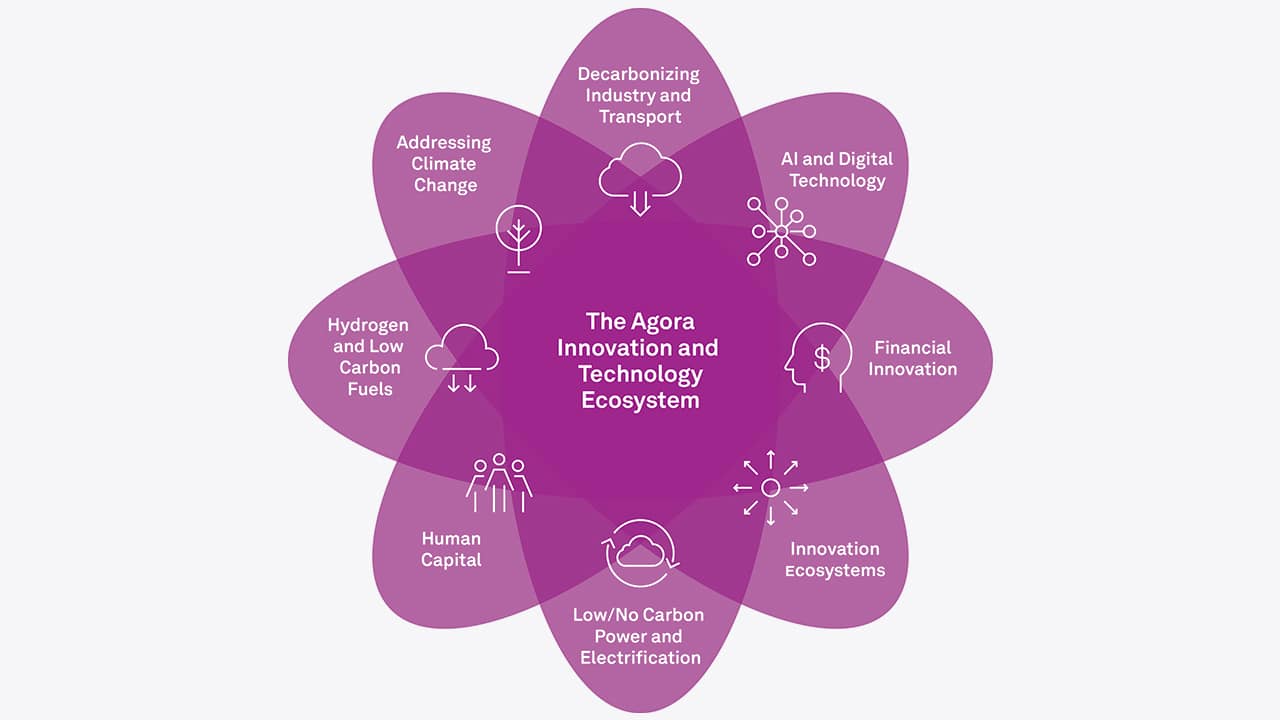The Agora Innovation and Technology Ecosystem

Agora Themes
-
 Decarbonizing Industry & Transport
Decarbonizing Industry & Transport- Carbon Capture, Utilization and Storage (CCUS)
- Methane Abatement in Practice
- Industrial Decarbonization Stories
- Carbon Removal: Technical and Natural Solutions
- Innovative Uses for Carbon and Waste Products
- Managing Supply Chains for Low Emissions
- EVs – Adoption, Charging, and Batteries
- Electrification of Transport Beyond Passenger Cars
- Cities and Urban Centers of the Future
- The New Future of E-Mobility
- Innovations to Achieve Scale and Transform Hard-to-Abate Sectors
- Innovative Materials and the Built Environment
- Energy Efficient Buildings and Facilities
- Autonomous Vehicles Technologies
-
 AI and digital technology
AI and digital technology- Role of AI in Achieving Net Zero
- AI’s Expansion in Energy Sectors
- Digital Twin Technologies
- Robotics and Remote Operations
- Machine Learning Applications
- Scale and Security through Data-driven Digital Technologies
- Predictive Analytics and Simulation
- AI and Large Language Models
- Blockchain Applications in Energy
- Quantum Computing Advancements
- Industrial IoT and Sensor Technologies
- Cybersecurity and Infrastructure Risk
- V/R, A/R, and X/R
- Agile Design, Generative AI, and New Materials
- 5G, Connected Cars, and Mobility Technologies
-
 Financial innovation
Financial innovation- Role of Corporate VCs in Financing Low Carbon Businesses
- Clean Tech and Energy M&A
- Institutional Investing in Clean Technology
- Investment Models for Transitioning Power Grids
- Special Purpose Acquisition Corps (SPACs)
- Investments Trends in Energy Transition
- Crowdfunding Energy Start-ups
-
 Innovation ecosystems
Innovation ecosystems- Business Models for Innovation Advancement
- Energy Transition and Creating New Businesses and Industries
- Investment and Funding for Innovation
- Global Energy Innovation Ecosystems
- Strategies for Achieving Scale and Commercialization
- Innovation Incubation and Universities
- Government Innovation and the Energy Ecosystem
- The Power of National Labs in Energy Innovation
- Influence and Support from Corporate Technology Divisions
-
 Low/No Carbon Power and Electrification
Low/No Carbon Power and Electrification- Electrifying Everything: Low Carbon Initiatives
- Next Generation Solar and Wind
- Advanced Nuclear (SMR) Technology
- Battery Storage Technologies
- Commercial Fusion Power Generation
- Microgrids and Grid Integration
- Transitioning Clean Energy Supply Chains with New Materials
- Alternative Renewable Technologies
- Geothermal Energy for Power Generation
- Energy Storage Systems Beyond Batteries
- Energy Demand Management Solutions
-
 Human capital
Human capital- Innovations in the Workforce
- AI and the Workforce of the Future
- Changing Face of Executives in Energy and Clean Tech
- Diversity and Inclusion in Energy
- Developing Future Energy Leaders
- Leading with Integrity and Purpose
- Recruiting Talent to Energy and Academic Programs
- Re-skilling and Talent Re-deployment
- Social Impacts of energy Transition – Global Perspective
- Industry Transition and Attracting Younger Workers
- Leadership and Success in New Energy Industries
-
 Hydrogen and low carbon fuels
Hydrogen and low carbon fuels- Hydrogen, Sustainable Gas, and Biofuels
- E-fuels and Synthetic Fuels
- Mobility and Freight with Hydrogen
- Low Carbon Fuel Solution Disruptors
- Financing Hydrogen Markets
- Hydrogen Economy Regionally/Local Hydrogen Hubs
- Decarbonizing Shipping, Ocean Freight and Aviation Fuels
- Meeting Climate Goals with Green Hydrogen Applications
- Hydrogen Solutions to transform Hard to Abate Sectors
- Hydrogen as an Energy Carrier
-
 Addressing Climate Change
Addressing Climate Change- Carbon Offsets and Markets
- Emissions Measurement Technologies
- Adaptation and Physical Risk
- Emissions Abatement Technologies
- Climate Change Mitigation
- Nature-based Solutions for Carbon Abatement
- Advanced Modeling and Climate Science
- Ocean Innovation and Sustainability
- Biodiversity Initiatives and Credits
- Geoengineering and Solar Radiation Management
- Practicalities of Emissions Measurement, Reporting and Verification (MRV)
